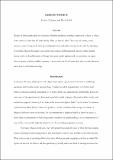Files in this item
Common worship
Item metadata
| dc.contributor.author | Cockayne, Joshua | |
| dc.contributor.author | Efird, David | |
| dc.date.accessioned | 2018-07-13T10:30:06Z | |
| dc.date.available | 2018-07-13T10:30:06Z | |
| dc.date.issued | 2018-07-01 | |
| dc.identifier | 252781599 | |
| dc.identifier | bac5180a-01d5-4016-9e1b-638b69ab606e | |
| dc.identifier | 85049521830 | |
| dc.identifier | 000436785200002 | |
| dc.identifier.citation | Cockayne , J & Efird , D 2018 , ' Common worship ' , Faith and Philosophy , vol. 35 , no. 3 , pp. 299-325 . https://doi.org/10.5840/faithphil2018611103 | en |
| dc.identifier.issn | 0739-7046 | |
| dc.identifier.other | ORCID: /0000-0002-1545-8247/work/61133226 | |
| dc.identifier.uri | https://hdl.handle.net/10023/15353 | |
| dc.description | Joshua Cockayne thanks the Templeton Religion Trust for their generous funding during the writing of this article. | en |
| dc.description.abstract | People of faith, particularly in the Judeo-Christian tradition, worship corporately at least as often, if not more so, than they do individually. Why do they do this? There are, of course, many reasons, some having to do with personal preference and others having to do with the theology of worship. But, in this paper, we explore one reason, a philosophical reason, which, despite recent work on the philosophy of liturgy, has gone underappreciated. In particular, we argue that corporate worship enables a person to come to know God better than they would otherwise know him in individual worship. | |
| dc.format.extent | 496309 | |
| dc.language.iso | eng | |
| dc.relation.ispartof | Faith and Philosophy | en |
| dc.subject | B Philosophy (General) | en |
| dc.subject | BL Religion | en |
| dc.subject | T-NDAS | en |
| dc.subject | BDC | en |
| dc.subject | R2C | en |
| dc.subject.lcc | B1 | en |
| dc.subject.lcc | BL | en |
| dc.title | Common worship | en |
| dc.type | Journal article | en |
| dc.contributor.institution | University of St Andrews. School of Divinity | en |
| dc.identifier.doi | https://doi.org/10.5840/faithphil2018611103 | |
| dc.description.status | Peer reviewed | en |
| dc.date.embargoedUntil | 2018-07-01 |
This item appears in the following Collection(s)
Items in the St Andrews Research Repository are protected by copyright, with all rights reserved, unless otherwise indicated.

